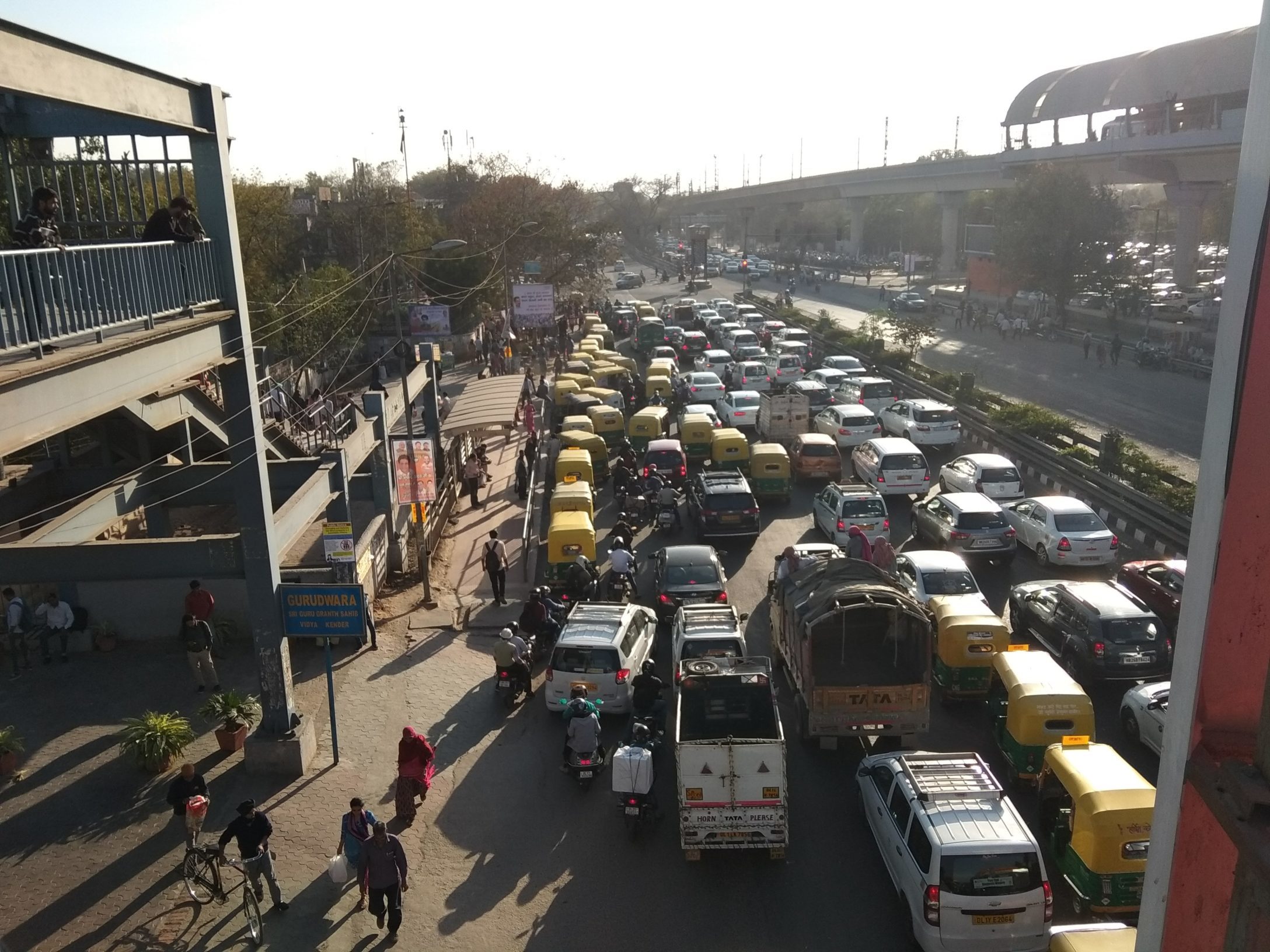December 5, 2018
Delhi, India
“Take the subway,” my sister told me when I went into the kitchen coffee mug in hand, looking for the car keys. She has a borderline obsession with the Delhi Metro, and rightly so. It is a wonder, no less. It goes everywhere in the city, to old parts and new, and it has reserved compartments for women. It is structure and efficiency in a city that has defied it for millennia. I was going to my studio, 30 kilometres away.
“I’m going to drive,” I told her and she chortled. I’d spent the last evening making a new Spotify playlist; besides, didn’t the smog outside mean that most people would stay home? “Nawaab,” she said and rolled her eyes at me—the word for prince in Urdu. That was ironic, I said, considering I am always too broke for fuel.
I got on the road and in fifteen minutes, no surprise, I was stuck in traffic. Delhi traffic is the city’s curse. It happens both suddenly and constantly: bottlenecks of cars jammed against one another in a mutual cosmic mistake. Fuck, I thought.
“My hair has fallen off in Delhi traffic,” said an Uber driver stalled next to me, through the window, as his passenger played music loudly on his phone. We discussed the weather—a vast dome of smog—and the passenger joined in to say he didn’t know what the fuss was about. “It’s only pollution,” he said. He changed his song and the driver sighed. A young man with a Zayn Malik-inspired haircut walked up to my window and asked for a lighter. The traffic was so dense that everyone had gotten out to lean on the boots of their cars. “A party,” I thought resignedly, and got out too. Zayn Malik gave me a cigarette and shook my hand before he left.
Overfamiliarity is the best and worst thing about Delhi. It’s why we don’t have manners, or say thank you, or use the Hindi and Urdu word for please. “In insult there is love,” is a common saying here. Twisted. I asked my Uber friend for his opinion. “Don’t overthink it,” he said, sounding like almost everyone I know.
Forty minutes passed, and I decided to make use of my time. I sent voice notes and pictures of the traffic jams to my friends abroad. It was night in the Western hemisphere. “We’re going to perish here,” said the Uber driver, now a bit frantic.
It was 11:30 when the traffic begun to inch slowly towards the end of the highway, and we all got back in our cars. The passenger in the Uber mentioned this was “wedding traffic.” December in Delhi is an auspicious time to wed, even though it feels like a sulphur chamber. This annoyed me, and I turned my own music up: screeching Birmingham 70s punks.
I looked around and saw the skyline bisected by the tomb of Humayun, one of our kings famous in history for spending too much time in the library. It was thrilling how his tomb shone through the smog, and I remembered times when my friends and I would sneak into his gardens drunkenly to try to communicate with his ghost.
“MOVE,” someone shouted. The traffic had cleared out. The Uber driver was gone. Progress.
I was tired, and decided to take a coffee break from my drive at an old roastery revamped into an Italian coffee shop. I slurped an espresso and checked my phone. “Heading to lunch?” my barista asked. “No, work.” I was hungry, I realized. It was only 1 p.m.; I could quickly eat before work.
It was only a fifteen-minute drive in no traffic from the coffee shop to my favorite kebab shop. When I got there, I told Ilyas, who was grilling a seekh kebab, about the traffic. “Jannat urf Jahannum,” he responded, referring to Delhi: “Heaven, but also, hell.”
A group of American tourists walked by. “Dude, Shawarma!” they said, and neither of us bothered to interject them that it was in fact, not. “Is it safe?” one of them asked, and Ilyas scoffed, and I shrugged. “Ha! Safe!” I said to Ilyas when they left. Maybe after two decades of my eating at his shop, Ilyas finally thought I was cool.
I ate my kebab roll in the car. After I finished, I went back in for a chai, because there was an argument between two men on the road I stayed to watch. “Shouldn’t you be at work?” Ilyas said to me and I was irked. I paid him and left. “Drive safe,” he said.
Now the roads were emptier, calmer. At mid-day, Delhi sleeps. Swarms of people sprinted across the highway. A group of aunties with their saris hunched up to their knees raced across with their palms raised at me. A young woman ran through with her earphones trailing behind her.
It was now 3:30 and I was almost at work when I remembered that I had an errand to run for a wedding next week. The day was lost. I got back on the same highway I had just exited, and felt like a livestream of the Sisyphean myth.
There was traffic again.
When I was abroad, I used to miss this. Dust, noise, and chaos—I would sit on my bed in less-temperamental Western Europe and crave it. Sometimes driving in Delhi feels like being part of a vein in the heart of the ancient metropolis that is my home. At night, it’s glorious, when everything old about the city comes to life and you could smell small white flowers on big roads.
But all I felt was exhaustion, and faint sense of terror.
“Mad,” my friend had responded to my pictures from earlier in the day. The sun set at around six, as I rolled onto the street that took me home. Delhi lit up in a fleeting, deceptive calm. “You’re all mad there.”





